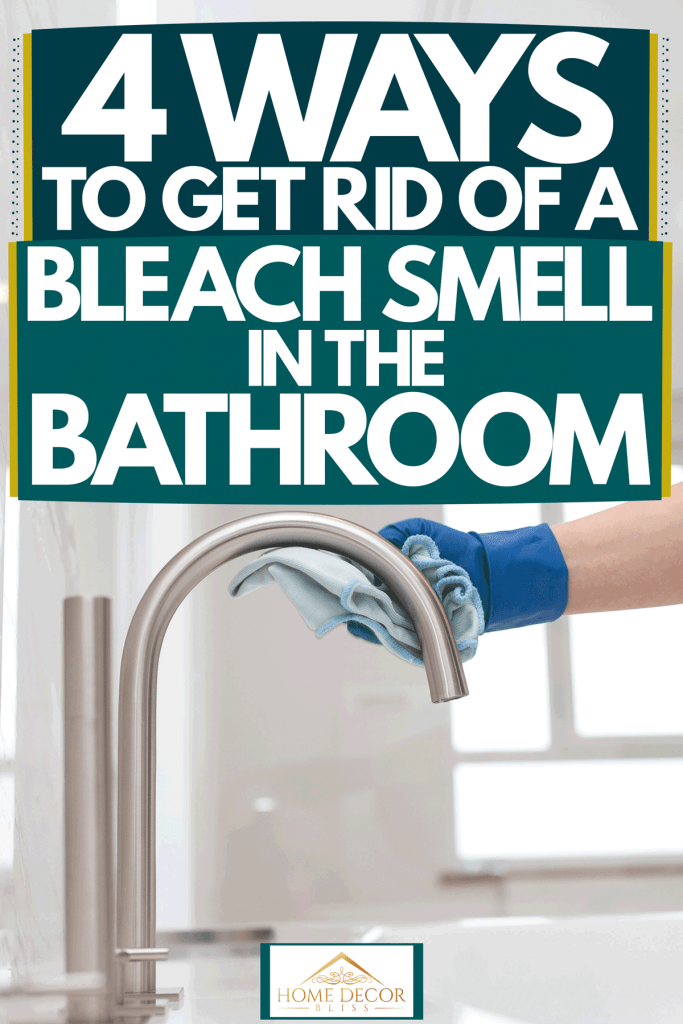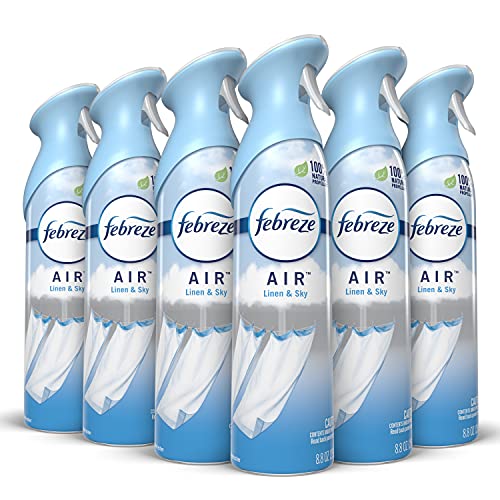Bleach is one of the most powerful and strongest disinfectants that you can use to clean your home. Not only is it inexpensive, but it can kill most germs, fungi, and various types of bacteria. But what about the smell that bleach can leave behind, especially after you've cleaned your entire bathroom? How can you get rid of it? We've found a few ways to eliminate bleach smell and discuss them here.
Here are 4 ways to get rid of a bleach smell in your bathroom:
- Ventilate the bathroom
- Use a citrus-based cleanser
- Use a room deodorizer
- Try a little baking soda
If you have been dealing with a lingering bleach smell in your bathroom for over 24 hours, this post is just for you. The chlorine in most commercial bleaches has an undeniable odor that can be very nauseating and irritating. Continue reading to learn how to safely get rid of the smell of bleach in your bathroom.
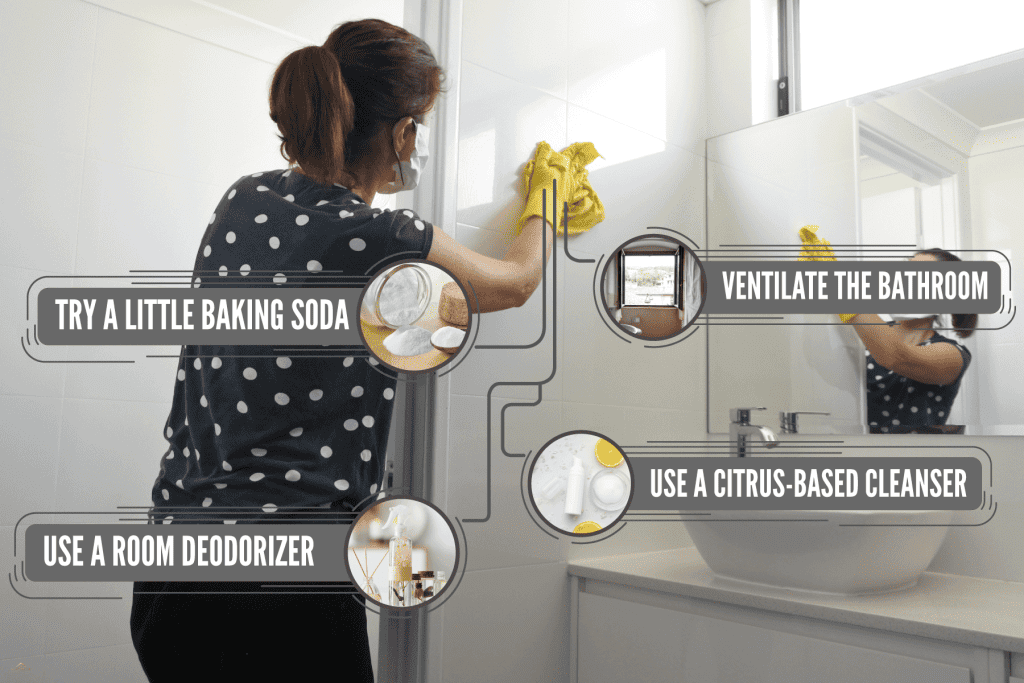
4 Ways To Get Rid Of Bleach Smell In The Bathroom
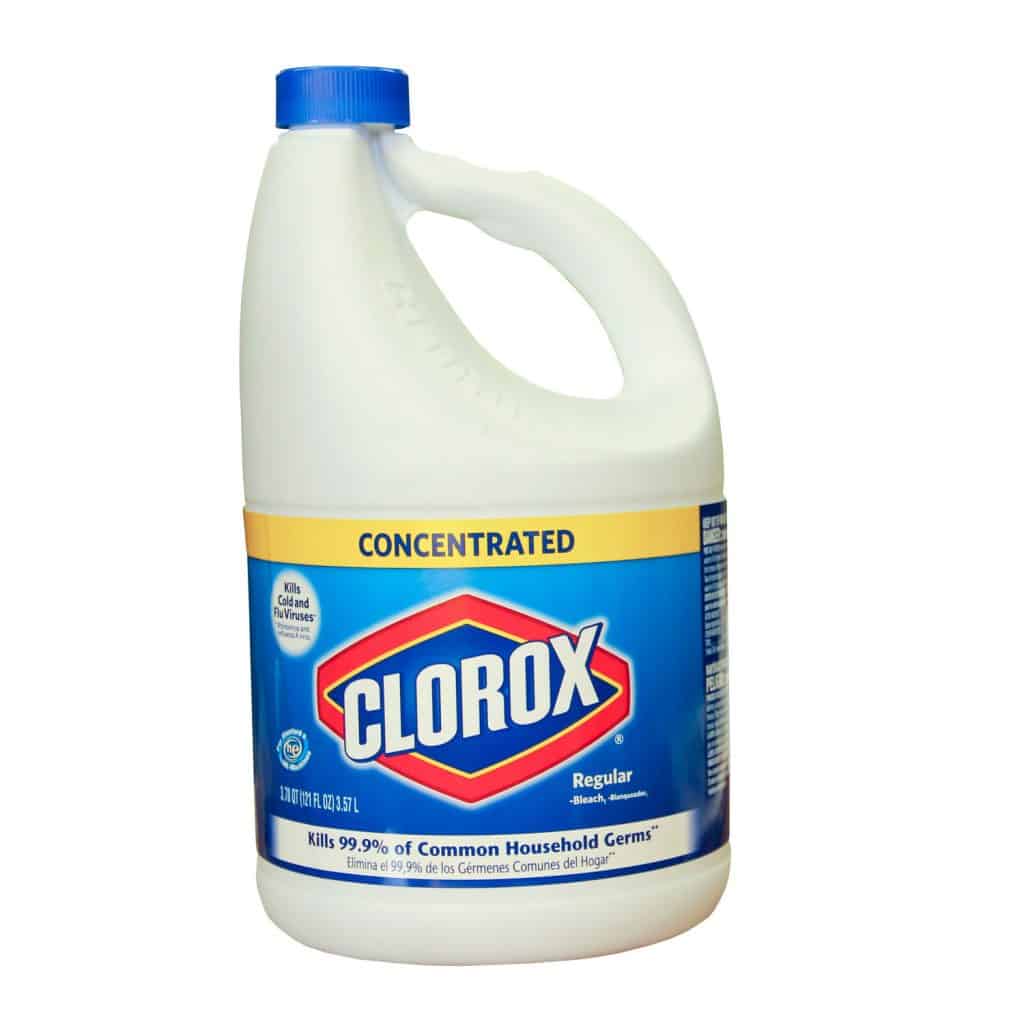
We sometimes add affiliate links and content that was curated and created by our team with the help of advanced ai tools to help showcase the best design styles.
1. Ventilate The Bathroom
If the weather isn't too warm or cold, open up your bathroom windows to help ventilate the room. Also, if you have an exhaust fan or a portable fan that you can place in the bathroom, turn it on. Make sure that fans direct the air out of the room and towards an open window.
A little airflow can help eliminate the bleach smell quickly and allow new fresh air from the outside to come into the room. If it's too cold outside to open the window, turn on the exhaust fan anyway. And if you have a dehumidifier, place it in the bathroom and allow it to run for a few hours. The dehumidifier can help draw some of the moisture out of the air, and with that will come the odor from the bleach.
Click here to see a humidifier on Amazon.
2. Use A Citrus-Based Cleanser
Citrus-based cleaners that include lemon or orange oil are great for neutralizing the strong odor of bleach. Keep in mind that you do not want to actually mix these cleaners with the bleach, but use them to go back over the surfaces initially cleaned with the bleach. It's best also to allow the cleaning solutions to sit on the bathroom surfaces for about 15 to 20 minutes before rinsing them off --they'll need time to neutralize the smell of bleach.
3. Use A Room Deodorizer
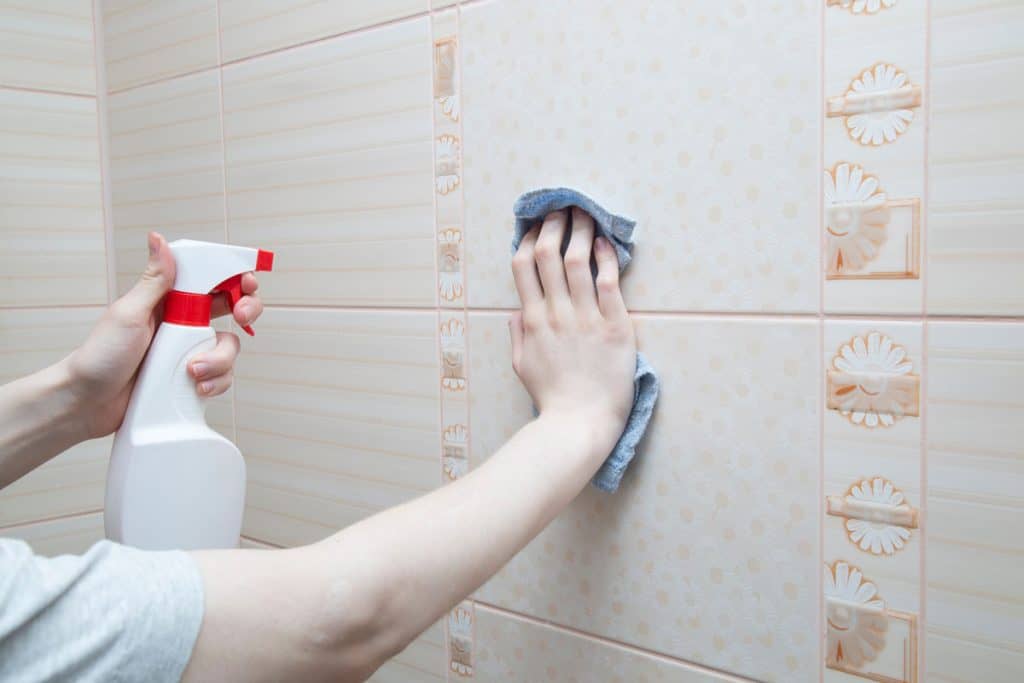
If you are looking to get rid of the bleach smell immediately, consider a room deodorizer such as Febreze, scented candles, air fresheners, or other strongly-scented products. You can also use this method in combination with ventilation so that the odor of the bleach can escape the room while you replace it with a more pleasant smell. If you light a candle in your bathroom, be sure to check on it periodically to avoid a fire hazard. Never let a candle burn in a room that's unattended for long periods of time.
Click here to see Febreze on Amazon.
4. Try A Little Baking Soda
Baking soda is one of the best deodorizers available today. Not only is it a great neutralizer, but it's all-natural and safe to use in large amounts. If you have a lingering bleach smell in your bathroom due to cleaning products recently used, consider going back over the areas with a bit of baking soda. Yes, this is additional work that you'll have to do, but it may be worth it if the bleach smell is super strong and has been lingering for several days. Baking soda can help to absorb the odor on the surfaces quickly.
You can also take two or three bowls and fill them with baking soda to place in the bathroom. Let the bowls sit on the countertops or the floor until they completely absorb the smell. This may take a few days, and you may need to buy a few boxes of baking soda.
Click here to see baking soda on Amazon.
Why Does The Bathroom Smell Like Bleach?
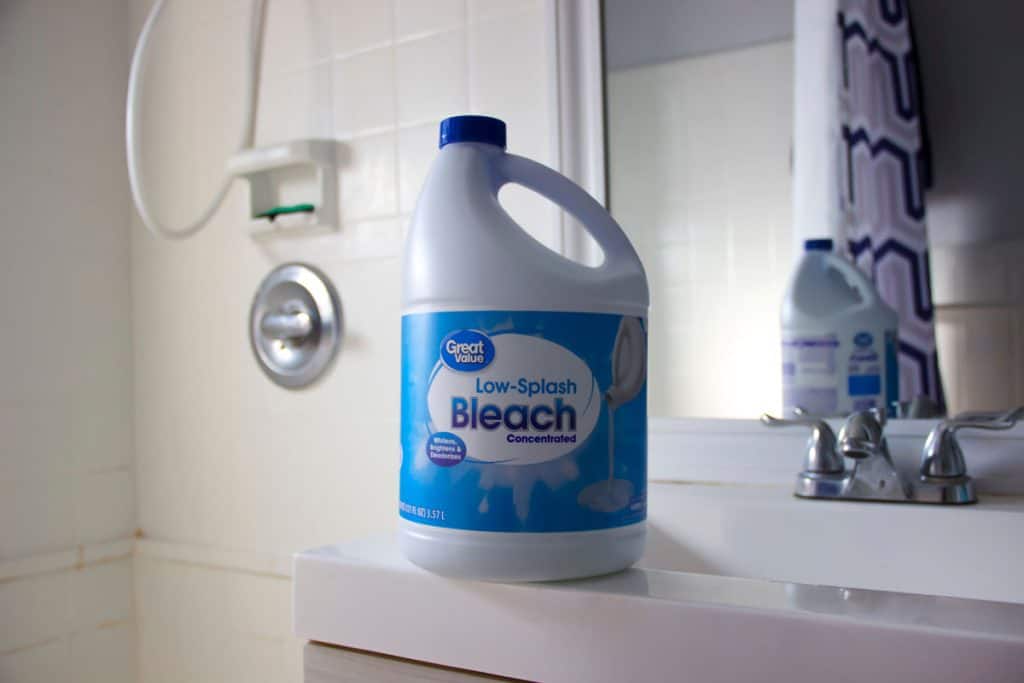
While the most common reason a bathroom may have a lingering bleach smell is from a recent cleaning, there can be other reasons that a bleach-like odor may permit your bathroom. Sometimes the remnants of other cleaning solutions, chemical gases, or bacteria buildup can also cause your bathroom, or other areas of your home, to harbor an ammonia-like or bleachy odor. Let's look closer at some of these causes and how to mitigate them.
Dirty water pipes
Unfortunately, cleaning your bathroom sink regularly won't translate into clean water pipes beneath the sink. The truth is that these pipes can develop a biofilm affect area that forms from frequent use. Over time, this bacteria becomes exposed to the air in your bathroom and can cause a very strong odor, similar to that of ammonia or bleach.
You can use a drain cleaner to clean the dirty pipes or have a plumber come to clean them manually. Ironically, you can also use a solution of diluted bleach and water to get rid of the odor. Allow the solution to sit in the pipe for about 10 minutes before rinsing it for 5 minutes with hot water. It's a good idea to clean the pipes for the shower drain as well.
Uncleaned pet urine
If you have a young pet that's not bathroom trained, the smell may come from lingering urine somewhere in the bathroom or nearby. Pet urine tends to smell like ammonia and can linger for months if not cleaned up immediately. If you have ammonia or bleach-like odors coming from your bathroom, thoroughly clean the entire bathroom top to bottom, including the toilet, shower, floor, and areas around the sink.
Be sure to clean the surfaces using a disinfectant so that it will neutralize the odor upon impact. You also want to clean and disinfect any rugs that you have in the bathroom as well. It's best to clean them with a carpet cleaner or you can simply throw them in the washer if possible.
Dirty drain traps
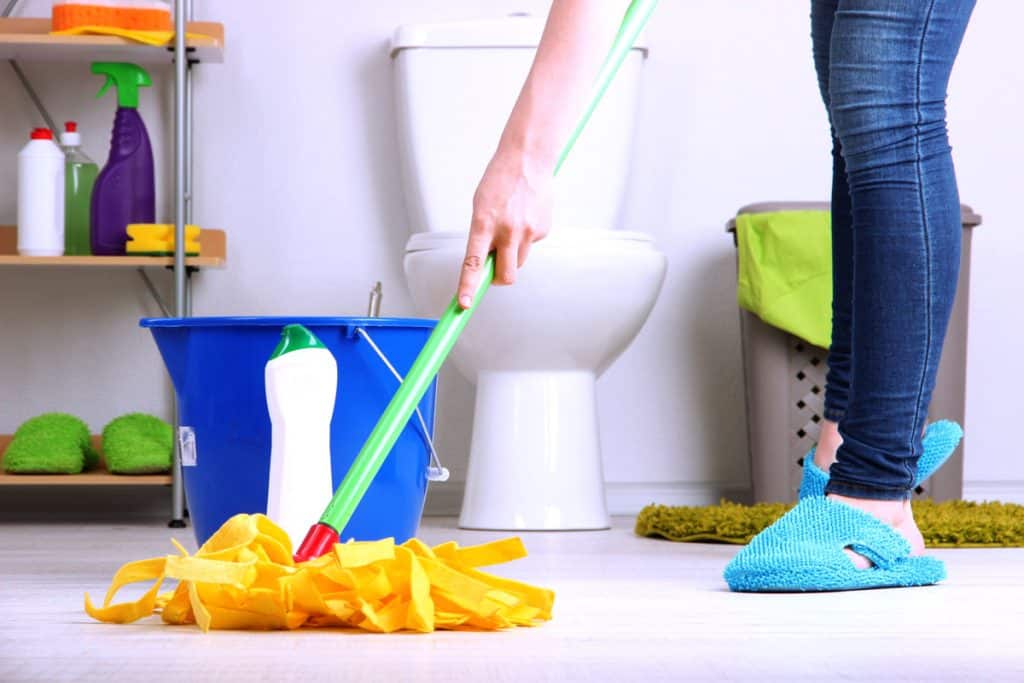
The drain pipes in your bathroom are located at the bottom of your toilet bowl and the bottom of your sink. These pipes are designed to keep the gases from the sewer out of your house. You'll notice a curved pipe beneath your sink that has a U-shape. This sink contains a valve that creates a physical barrier between your bathroom and the sewer system so that gases cannot come inside your home.
Sometimes if you don't use the sink or the toilet for an extended period of time, the trap will begin to dry out, resulting in an open pathway for sewer gases to enter your house. This can often be attributed to the amount of humidity in your home and how often the plumbing in your entire home is utilized. You can prevent this from occurring by simply using your home's plumbing regularly. If the problem continues, you may need to contact a plumber to check the valves.
What Can You Mix With Bleach To Make It Smell Better?
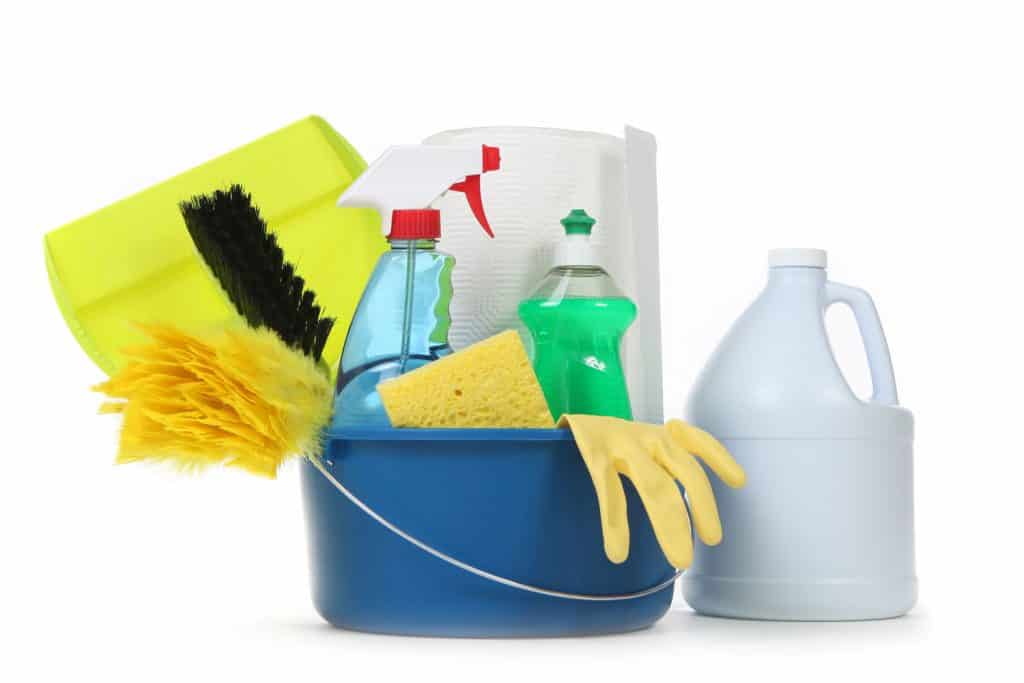
It's been proven dangerous to mix bleach with household cleaners, and it's generally not recommended. Anything from everyday multi-purpose cleaners, glass cleaners, and even distilled vinegar can come with serious health risks if combined with bleach. This is because the chemicals can give off chlorine gas which is dangerous to inhale and can cause irritation to the eyes, nose, and skin. If you have allergies, are asthmatic, or have skin sensitivities, it could be especially harmful.
The key to using bleach safely is to keep it super simple. Never mix bleach with products containing bleach or other cleaning products such as ammonia, acetone, or homemade cleaners. Always follow the manufacturer's directions on bleach-based products carefully. Also, always ventilate the room before using bleach as a cleanser, as this will cut down on the strong odor after the cleaning has been finished.
And it may seem like a good idea to mix essential oils with bleach, but this is also not recommended. Certain essential oils such as lime, citrus, and grapefruit are especially acidic and could also create chlorine gas when combined with bleach. If anything, use an oil diffuser in the room after you have cleaned the surfaces with bleach.
You can also purchase scented Clorox bleach if you are looking to help mask the bleach's strong odor while you clean. Clorox scented bleach comes with the same disinfecting, whitening, and deodorizing benefits as typical Clorox, but it comes with a long-lasting fragrance leaving your clothes or bathroom and kitchen surfaces with a fresh scent. The bleach is just as concentrated as traditional bleach and will still need to be diluted when used as a disinfectant or cleaning solution.
Click to see scented Clorox on Amazon.
How Long Does It Take For Bleach To Air Out?
It typically takes bleach anywhere from 10 minutes to an hour to air out. The time depends on how well you diluted the bleach, where you applied it, and how much was applied to various surfaces. If you want to speed up the air out time, you can try opening a window, using a dehumidifier, turning on an exhaust fan, or placing a portable fan in the room. The more ventilation the room has, the quicker it will air out and lose the strong smell of bleach.
To reduce and prevent the lingering smell of bleach, be sure to use no more than five tablespoons per gallon of water or four teaspoons per quart of water.
When using bleach as a disinfectant, it's also important to know on what surfaces you should not use it. Remember that bleach is a caustic solution and should always be used with caution.
You should always dilute bleach and never use it by itself. Even when bleach is diluted, it's not recommended for use on wood, upholstery, carpet, metal, or solid stone surfaces. These materials can be damaged by bleach, and it's recommended that you use disinfectant and cleaner specifically formulated for them.
Can The Smell Of Bleach Make You Sick?
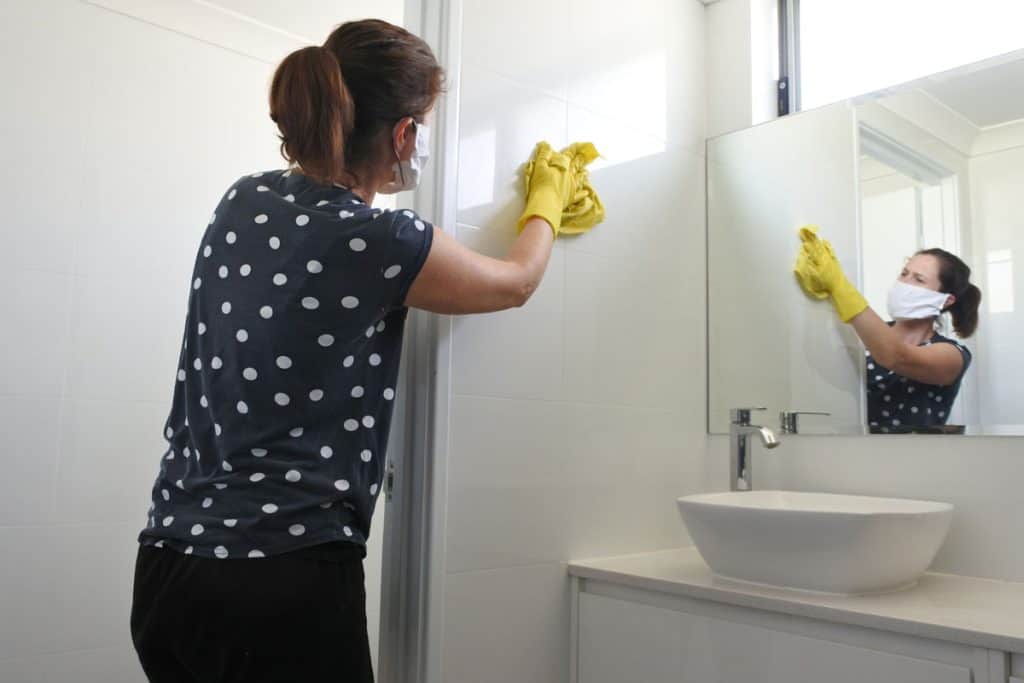
Yes, the smell of bleach has been known to make some people nauseous. Most bleach products, including Clorox, contain sodium hypochlorite, which is responsible for the toxic fumes emitted from bleach products. Inhaling these fumes can cause damage to your lungs and organs and may irritate your eyes, nose, and throat.
If you find yourself becoming light-headed or coughing and coughing excessively when in the presence of bleach products, chances are your body is responding to the corrosive properties of the sodium hypochlorite. In which case, it's best to leave the area immediately, flush out your eyes (if needed), and get some fresh air.
Wrapping Things Up
We hope that this post has provided you with the information you were looking for to remove the smell of bleach from your bathroom. Remember, the more you dilute bleach before applying it to your bathroom's surfaces, the lighter the odor will be after the fact. Always make sure that you completely rinse away all remnants of the bleach solutions after cleaning the surfaces of your bathroom. If the bleach stays on the surface, it will continue to emit a strong odor.
Before you go, be sure to check out some of our other posts:
How To Get Water Spots Off Bathroom Fixtures [5 Easy Steps]
How To Remove Rust From Chrome Bathroom Fixtures [6 Methods]
